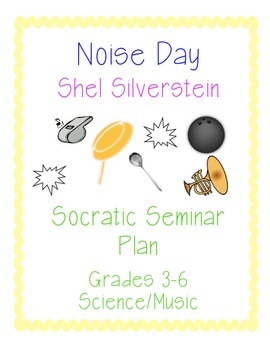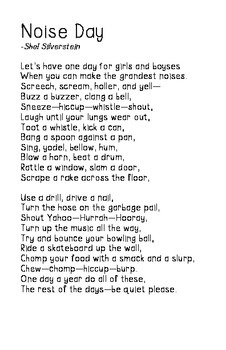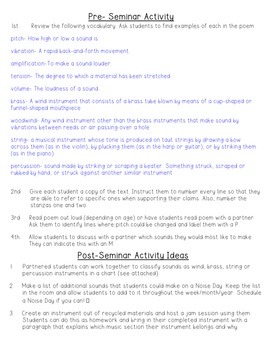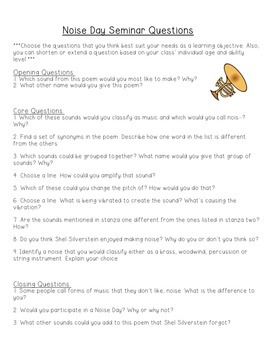SHEL SILVERSTEIN'S NOISE DAY POEM SOCRATIC SEMINAR + ACTIVITY- SCIENCE OF SOUND
Stephanie Fosdeck
54 Followers
Grade Levels
3rd - 6th
Subjects
Resource Type
Standards
CCSSRL.3.1
CCSSRL.3.5
CCSSRL.3.10
CCSSSL.3.1
CCSSSL.3.2
Formats Included
- PDF
Pages
5 pages
Stephanie Fosdeck
54 Followers
Description
Looking for a way to engage your students in thoughtful conversation and meet the Speaking and Listening goals of the Common Core? Then, practicing seminar is definitely worth your time.
I trained and taught over a ten year period under the Paideia philosophy which utilizes socratic seminar as one of the three columns of instruction. Seminar is an excellent way to assess student understanding throughout a project/unit. Used midway through, teachers can identify areas where students need further clarification. It can also be used as an excellent form of post assessment.
This socratic seminar is specifically designed to address a unit on sound. It would be appropriate for other grades (3-6), but was created with the 3rd grade FOSS Science Kit (Physics of Sound) in mind. However, you do not need to have taught the Foss kit in order to utilize this seminar plan.
Questions focus on sound (vibration, amplification, pitch) as well as brass, woodwind, percussion and string instruments. A brief review the vocabulary words is suggested. These can be found in the pre-seminar activity. Review will ensure that all students understand the questions and can respond thoughtfully.
This plan includes:
* Pre-Seminar activity
* Typed copy of poem (Noise Day) for seminar purposes only
* Seminar Questions (opening, core and closing)
*Post-Seminar activity ideas to choose from
*Post-Seminar musical instrument chart partner activity
I trained and taught over a ten year period under the Paideia philosophy which utilizes socratic seminar as one of the three columns of instruction. Seminar is an excellent way to assess student understanding throughout a project/unit. Used midway through, teachers can identify areas where students need further clarification. It can also be used as an excellent form of post assessment.
This socratic seminar is specifically designed to address a unit on sound. It would be appropriate for other grades (3-6), but was created with the 3rd grade FOSS Science Kit (Physics of Sound) in mind. However, you do not need to have taught the Foss kit in order to utilize this seminar plan.
Questions focus on sound (vibration, amplification, pitch) as well as brass, woodwind, percussion and string instruments. A brief review the vocabulary words is suggested. These can be found in the pre-seminar activity. Review will ensure that all students understand the questions and can respond thoughtfully.
This plan includes:
* Pre-Seminar activity
* Typed copy of poem (Noise Day) for seminar purposes only
* Seminar Questions (opening, core and closing)
*Post-Seminar activity ideas to choose from
*Post-Seminar musical instrument chart partner activity
Total Pages
5 pages
Answer Key
N/A
Teaching Duration
N/A
Report this resource to TPT
Reported resources will be reviewed by our team. Report this resource to let us know if this resource violates TPT’s content guidelines.
Standards
to see state-specific standards (only available in the US).
CCSSRL.3.1
Ask and answer questions to demonstrate understanding of a text, referring explicitly to the text as the basis for the answers.
CCSSRL.3.5
Refer to parts of stories, dramas, and poems when writing or speaking about a text, using terms such as chapter, scene, and stanza; describe how each successive part builds on earlier sections.
CCSSRL.3.10
By the end of the year, read and comprehend literature, including stories, dramas, and poetry, at the high end of the grades 2–3 text complexity band independently and proficiently.
CCSSSL.3.1
Engage effectively in a range of collaborative discussions (one-on-one, in groups, and teacher-led) with diverse partners on grade 3 topics and texts, building on others’ ideas and expressing their own clearly.
CCSSSL.3.2
Determine the main ideas and supporting details of a text read aloud or information presented in diverse media and formats, including visually, quantitatively, and orally.





